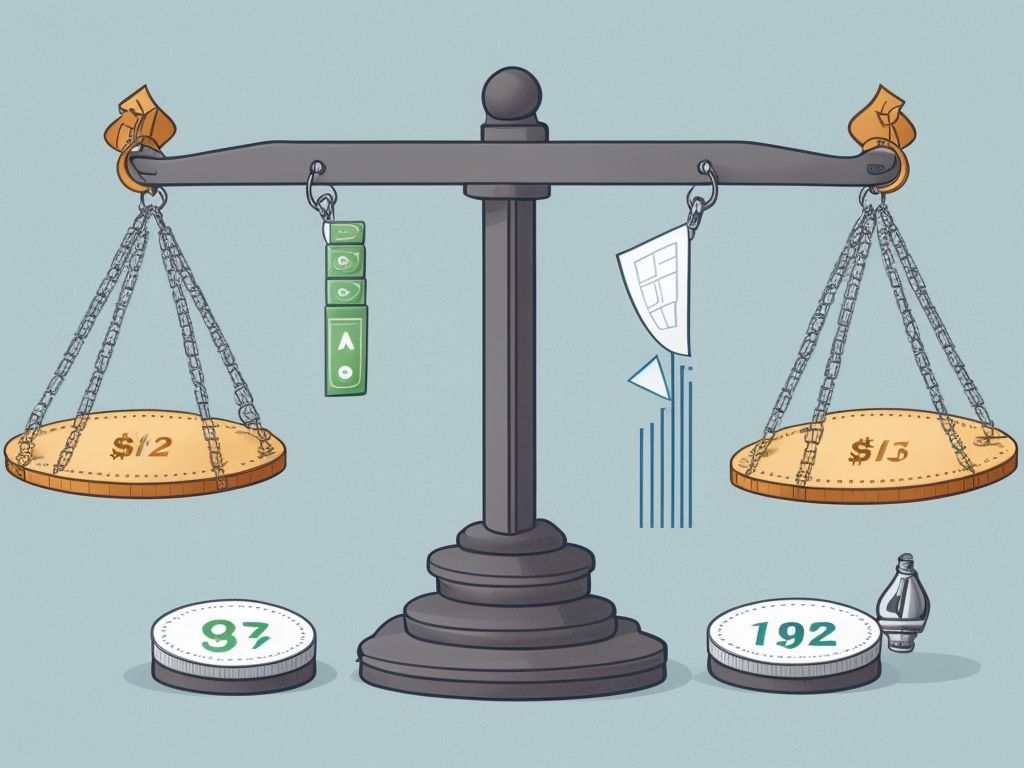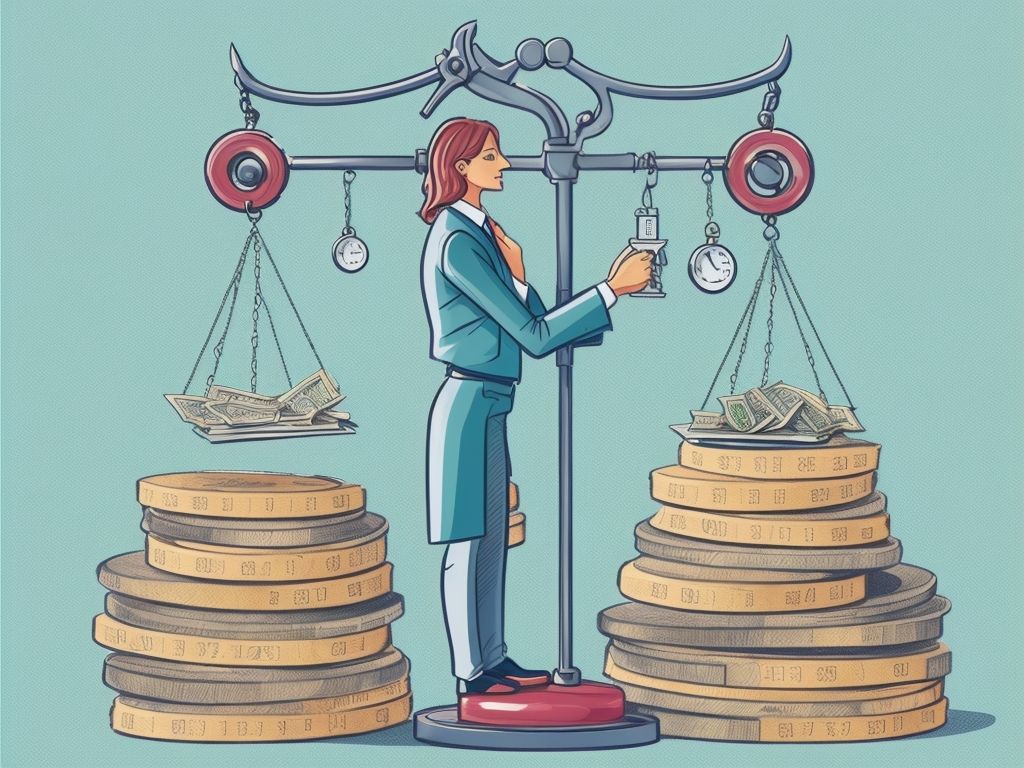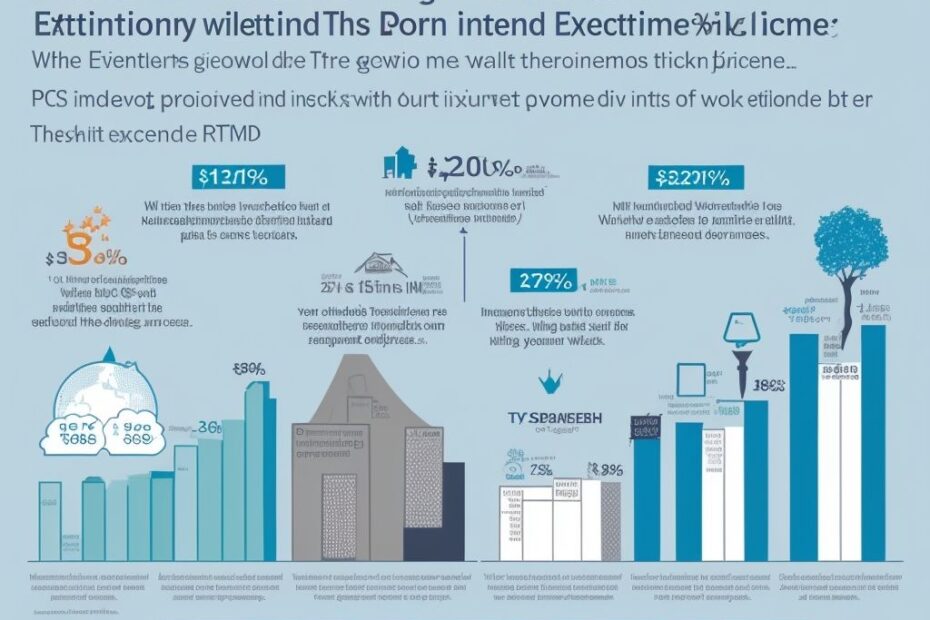Dividend ETFs and individual stocks are two investment options that income seekers often consider. Dividend ETFs, or exchange-traded funds, are investment funds that hold a diversified portfolio of dividend-paying stocks. On the other hand, individual stocks are shares of specific companies that pay dividends to their shareholders. Understanding the pros and cons of each option is crucial for making informed investment decisions.
Dividend ETFs work by pooling money from multiple investors to create a portfolio of dividend-paying stocks. These funds provide a convenient way to access a diversified range of stocks, offering income seekers the potential for regular dividend payments and the benefits of diversification.
Individual stocks, on the other hand, involve purchasing shares of specific companies. By investing in individual stocks, income seekers have the potential for higher returns if the company performs well and increases its dividend payments. However, this option also carries higher risks as the value of individual stocks can fluctuate more than that of ETFs.
When considering dividend ETFs, some pros include diversification, lower stock picking expertise required, and automatic dividend reinvestment. However, cons may include potential lower yield and lack of control over the underlying stocks.
Pros of individual stocks include the potential for higher returns and greater control over investment choices. However, cons may include higher risk, lack of diversification, and the need for extensive research and analysis.
For income seekers, key considerations include risk tolerance, time commitment, diversification, and tax implications. It is important to assess your risk appetite, time available for managing investments, the need for diversification, and tax considerations before deciding between and individual stocks. By carefully weighing the pros and cons and considering personal factors, income seekers can make educated decisions to meet their investment goals.
What are Dividend ETFs?

Photo Credits: Www.Mfea.Com by Michael Thompson
Dividend ETFs, also known as dividend exchange-traded funds, are investment funds that focus specifically on stocks that consistently pay regular dividends. Similar to mutual funds, dividend ETFs are unique in that they can be traded like individual stocks. As an investment vehicle, these ETFs provide investors with exposure to a well-diversified portfolio of dividend-paying stocks spanning various industries. One of the main advantages of dividend ETFs is the potential to earn regular income from the consistent dividends received, while also offering the opportunity for capital appreciation of the underlying stocks. This makes dividend ETFs an attractive option for income seekers who desire a steady stream of cash flow. Additionally, dividend ETFs offer the benefits of diversification through their broad-based portfolios, professional management, and the convenience of being traded on the stock exchange. However, it is important for investors to carefully consider their specific investment objectives, risk tolerance, and any associated fees before making the decision to invest in dividend ETFs.
How do Dividend ETFs Work?
Dividend ETFs work by investing in a diversified portfolio of stocks that pay dividends. They provide investors with exposure to a broad range of dividend-paying companies, reducing the risk associated with investing in individual stocks. These ETFs typically track an index, such as the Dividend Aristocrats, which consists of companies with a history of increasing dividend payments. By investing in these ETFs, investors can generate income through the dividends received from the underlying stocks. This income can be reinvested or taken as cash, providing a flexible option for investors. Dividend ETFs offer a convenient and efficient way to implement a dividend-focused investment strategy, making them a popular choice for income seekers.
Pro-tip: When considering dividend ETFs, it’s important to look at the expense ratio and dividend yield to ensure you are maximizing your return on investment.
What are Individual Stocks?

Photo Credits: Www.Mfea.Com by Donald Smith
Individual stocks are shares of ownership in a single company. What are individual stocks? When you invest in individual stocks, you become a shareholder and have the potential to earn profits as the company grows. Investing in individual stocks also comes with risks. The value of the stocks can fluctuate, and there is no guarantee of returns. Investing in multiple individual stocks requires careful research and monitoring. It is important to diversify your portfolio to mitigate risk. Pro-tip: Before investing in individual stocks, thoroughly research the company’s financial health, management team, and industry trends to make informed decisions.
How do Individual Stocks Work?
Individual stocks are shares of ownership in a specific company, giving investors the opportunity to participate in the company’s growth and profitability. When you buy individual stocks, you become a partial owner and have the potential to benefit from both capital appreciation and dividends. The value of individual stocks can fluctuate based on various factors such as company performance, market conditions, and investor sentiment. Investors can buy and sell individual stocks through brokerage accounts, and the success of their investments depends on their ability to accurately analyze and predict the performance of the specific companies in which they are invested.
How do individual stocks work? Let’s take a look at a true story: Sarah invested in individual stocks and carefully researched companies before buying shares. She picked technology stocks and saw impressive returns when the companies performed well. She also experienced losses when some companies faced challenges. Sarah’s understanding of how individual stocks work helped her make informed decisions and manage her investments effectively.
Pros and Cons of Dividend ETFs

Photo Credits: Www.Mfea.Com by Peter Green
Dividend ETFs have gained significant popularity among income seekers, but are they truly the best option? In this section, we’ll uncover the pros and cons of dividend ETFs, providing insights on their potential benefits and drawbacks. From their ability to provide diversified exposure to dividend-paying companies to the risks associated with market fluctuations, we’ll explore the factors that investors should consider when weighing the advantages and disadvantages of dividend ETFs. So, let’s dive in and discover whether these investment vehicles are indeed a promising choice for income generation.
Pros of Dividend ETFs
There are several advantages of investing in dividend ETFs for income seekers. These include:
- Portfolio Diversification: Dividend ETFs offer exposure to a wide range of dividend-paying stocks, which effectively spreads risk and reduces volatility.
- Regular Income: Dividend ETFs are specifically designed to provide regular dividend payments, enabling investors to earn a steady income stream.
- Cost Efficiency: Compared to actively managed funds, dividend ETFs generally have lower expense ratios, making them a cost-effective investment option.
- Professional Management: Dividend ETFs are managed by experienced professionals who carefully select and monitor dividend stocks, eliminating the need for investors to conduct individual stock research.
- Liquidity: Dividend ETFs can be easily bought and sold on major stock exchanges throughout the trading day, offering investors both liquidity and flexibility.
Cons of Dividend ETFs
While dividend ETFs can provide several benefits, there are also some drawbacks to consider: Cons of Dividend ETFs
- Lack of individual stock ownership limits control and decision-making power.
- Dividend ETFs may have higher expense ratios compared to individual stocks.
- Distributions may vary and can be unpredictable, leading to fluctuations in income.
- ETFs can be more susceptible to market volatility, impacting dividend payouts.
- Dividend ETFs may not align with specific investment objectives as they are a pooled investment vehicle.
Despite these cons, dividend ETFs can still be a viable option for income seekers. It is important to carefully evaluate individual needs and goals, assess risk tolerance, and consider the potential benefits before making a decision.
Pros and Cons of Individual Stocks

Photo Credits: Www.Mfea.Com by Jose Young
Individual stocks offer a world of opportunities for income seekers. In this section, we’ll explore the pros and cons of venturing into the realm of individual stocks. Discover the potential benefits that come with owning individual stocks, as well as the potential downsides. From potential growth to the risks involved, we’ll take a closer look at what makes individual stocks an intriguing option for those seeking income.
Pros of Individual Stocks
- Potential for high returns: Investing in individual stocks offers the potential for high returns, particularly if you choose well-performing companies.
- Greater control and flexibility: With individual stocks, you have the freedom to select specific companies of your choice and easily adjust your portfolio based on market conditions, providing greater control and flexibility.
- Opportunity for dividends: Some individual stocks offer regular dividends, allowing you to earn passive income on your investments.
- Investment in specific sectors or industries: Individual stocks enable you to concentrate your investments on particular sectors or industries that you believe will thrive, giving you focused exposure to growth areas.
- Potential for active management: If you possess the time and expertise, investing in individual stocks allows for active portfolio management, empowering you to make decisions based on company performance and market trends.
Investing in individual stocks can be a fulfilling experience, encompassing the pros of high returns, control and flexibility over your investments, and the opportunity to align your portfolio with your interests and market expectations.
Cons of Individual Stocks
- Investing in individual stocks can expose you to significant risks since your portfolio is concentrated in a few companies. If one of those companies performs poorly, it can have a significant impact on your overall returns.
- Individual stocks are often more volatile than diversified investment options like ETFs. The stock market can be unpredictable, and individual stocks can experience large price swings in response to market conditions, company performance, or other factors.
- Successfully investing in individual stocks requires extensive research and analysis. You need to thoroughly analyze the financial health, competitive position, and growth prospects of each company you invest in, which can be time-consuming and demanding.
- Buying and selling individual stocks often involves paying fees, such as brokerage commissions. These costs can eat into your investment returns, particularly if you frequently trade stocks.
- It can be challenging to consistently select winning individual stocks, and many investors fail to outperform the overall market. Unless you have significant knowledge and expertise in stock analysis, you may find it difficult to consistently make profitable investment decisions.
Considerations for Income Seekers

Photo Credits: Www.Mfea.Com by Vincent Brown
When it comes to generating income, income seekers face crucial considerations. In this section, we’ll dive into the factors that demand attention: risk tolerance, time commitment, diversification, and tax implications. Each aspect carries its own weight in determining the best approach for income generation. So, let’s explore these factors and discover the path that aligns with your financial goals and preferences. No more guesswork – solid insights await!
Risk Tolerance
Risk tolerance is a critical consideration when deciding between dividend ETFs and individual stocks for income seekers. Both options have their advantages and disadvantages, and understanding your risk tolerance will help make an informed decision.
- Dividend ETFs: These investment vehicles are ideal for individuals with a lower risk tolerance. They provide diversification by pooling together multiple stocks, reducing the impact of any single company’s performance on your investment.
- Individual stocks: Investing in individual stocks requires a higher risk tolerance as the performance of a single company can significantly affect your investment. It is crucial to carefully evaluate your comfort level with market fluctuations and potential losses before choosing this option.
Considering your risk tolerance, a diversified dividend ETF may be a suitable choice for conservative investors. It offers stability and lower risk, but potential returns may be more modest compared to individual stocks.
On the other hand, for those with a higher risk tolerance, investing in individual stocks could provide potential higher returns and greater control over your investment. However, it is important to understand and accept the volatility and potential losses associated with this option.
Time Commitment
When considering investing in dividend ETFs or individual stocks, one crucial factor to take into account is the time commitment needed. Here are several steps to assist you in evaluating the time commitment associated with each option:
- Research: Both dividend ETFs and individual stocks necessitate research to identify potential investments, comprehend the market, and evaluate performance.
- Monitoring: Dividend ETFs generally demand less time for monitoring since they are managed by professionals. Conversely, individual stocks require regular monitoring of company news, financial reports, and market trends.
- Trading: Purchasing and selling individual stocks may necessitate more time and effort as you must stay updated on market conditions and execute trades.
- Rebalancing: Dividend ETFs may need periodic rebalancing to maintain their desired asset allocation. This can be relatively straightforward and less time-consuming compared to managing a portfolio of individual stocks.
Fact: Investors who have limited time availability may discover that dividend ETFs are a more suitable option as they require less active management and monitoring.
Diversification
Diversification is of utmost importance when deciding between dividend ETFs and individual stocks. Here are some crucial factors to consider:
- Risk mitigation: Diversifying your investments across different asset classes and sectors is vital to reduce the impact of any single investment’s poor performance.
- Portfolio stability: Holding a diversified portfolio of dividend ETFs can provide stability and consistent income. These ETFs typically invest in a wide range of dividend-paying stocks.
- Growth potential: While dividend ETFs offer diversification, individual stocks present an opportunity for significant capital appreciation if chosen wisely.
- Customization: With individual stocks, you have the freedom to tailor your portfolio according to your investment strategy and risk appetite.
Considering diversification is crucial for long-term success, it is essential to weigh the pros and cons of both options before making a decision.
Tax Implications
The tax implications of investing in dividend ETFs and individual stocks is an important factor to consider when making investment decisions. Here is a table summarizing the tax implications for both options:
| Dividend ETFs | Individual Stocks | |
|---|---|---|
| Tax Efficiency | Dividends taxed at capital gains rates | Dividends taxed at individual rates |
| Capital Gains | Subject to capital gains tax upon sale | Subject to capital gains tax upon sale |
| Dividend Reinvestment | May have tax consequences | May have tax consequences |
| Tax Reporting | Receive Form 1099-DIV for tax filing | Receive Form 1099-DIV for tax filing |
Considering the tax implications, both dividend ETFs and individual stocks have their advantages and disadvantages. Dividend ETFs may offer advantages in terms of tax efficiency, as dividends are taxed at capital gains rates. On the other hand, individual stocks allow for more control over tax planning, as investors can choose when to sell and potentially benefit from long-term capital gains rates.
Understanding the tax implications, including tax efficiency, capital gains implications, dividend reinvestment, and tax reporting requirements, can help investors make informed choices. However, it’s important to consult a tax professional to fully understand and navigate the tax implications of each investment option.
When making investment decisions, it’s crucial to consider the tax implications of both dividend ETFs and individual stocks. Consulting with a tax professional is always recommended to ensure compliance with tax laws and optimize tax strategies.
Frequently Asked Questions
What are the common options for active investing?
Common options for active investing include ETFs (exchange-traded funds) and stocks.
What are the key differences between ETFs and stocks?
ETFs are like well-diversified portfolios that can include stocks, bonds, and precious metals, while stocks represent ownership in a publicly-traded company.
What are the advantages of investing in dividend ETFs?
Investing in dividend ETFs provides instant diversification, protection against being overly exposed to a sector that falls out of favor, and potential cost savings compared to owning individual stocks. It also saves time and potential headaches, as most dividend ETFs are well-diversified across industries.
What are the risks associated with investing in individual stocks?
Investing in individual stocks comes with higher risk due to reliance on a single company’s fortunes. It requires more time commitment, can encourage excessive trading activity, and does not provide the same level of diversification benefits as ETFs.
How do ETFs and individual stocks compare in terms of liquidity?
ETFs can be more illiquid than stocks depending on the specific fund, while stocks can have different levels of price volatility and liquidity.
What are the tax considerations for investing in dividend ETFs and individual stocks?
Both dividend ETFs and individual stocks are taxed at capital gains rates. However, the assets inside ETFs are bought and pooled together by fund managers, which may have different tax implications compared to owning individual stocks.
